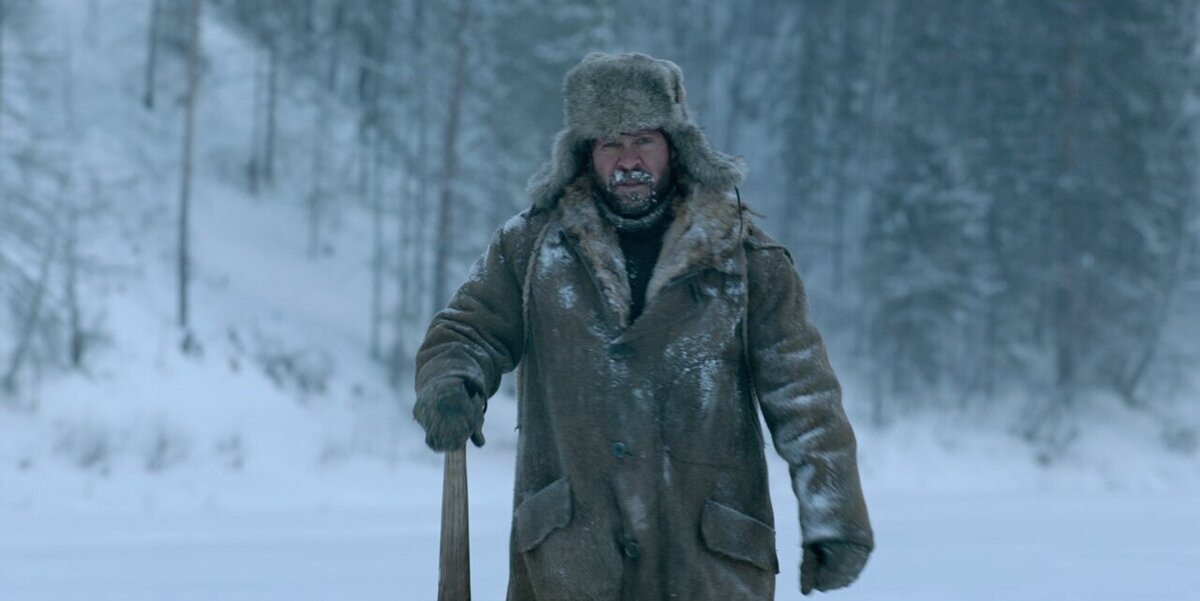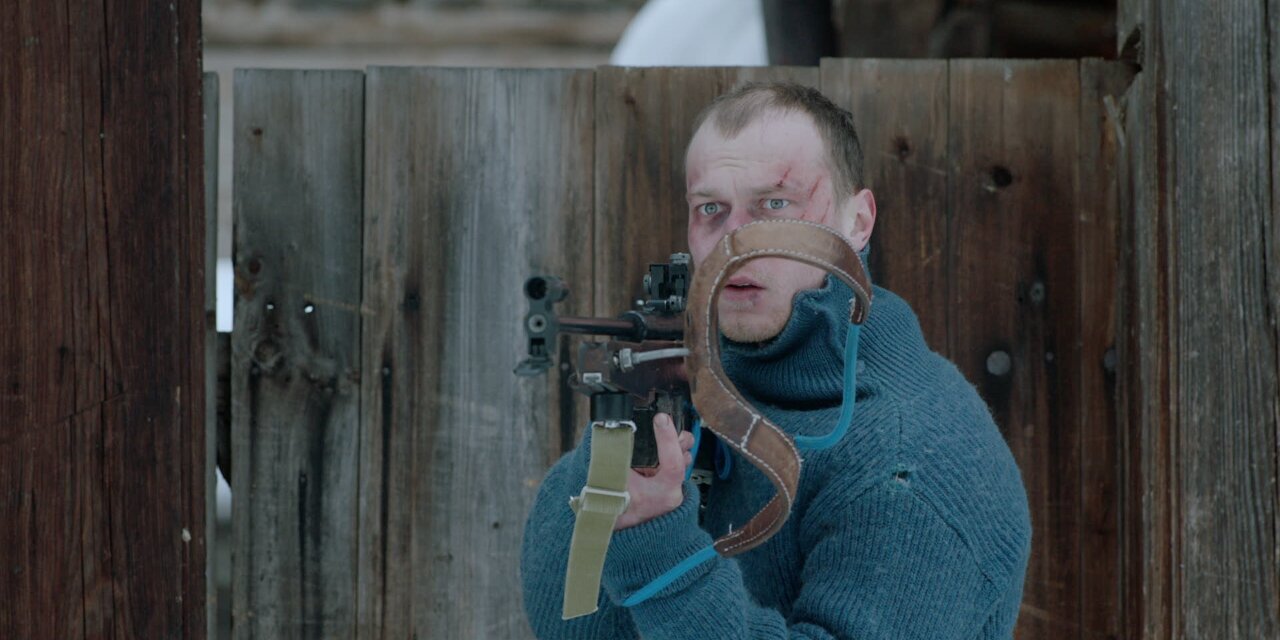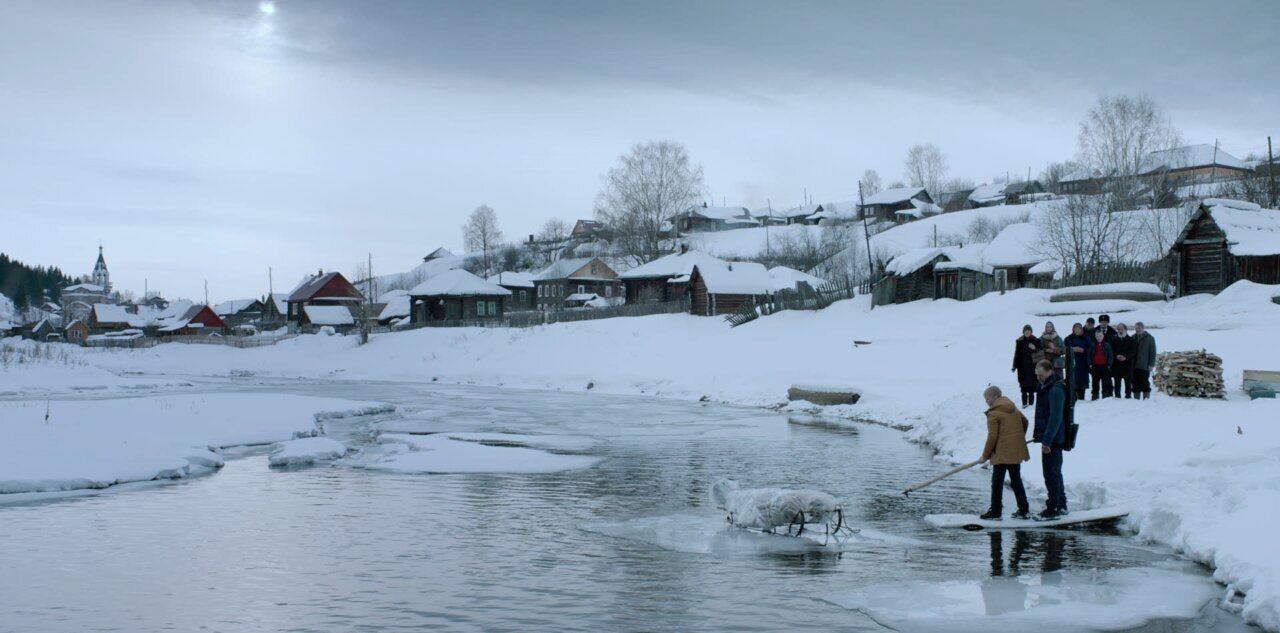«Podelniki» - Film Review by Kinoafisha

Or maybe just become snow.
Biathlete and master of sports, Petya (Yuri Borisov), together with his wife, Nastya (Elizaveta Yankovskaya), almost a Decembrist, for unknown reasons, returns to the village of Kyn in the Perm Region, where he grew up. The young couple shivers in an old cold "pazik" car. From the window, they see snowy hills and fir trees bent under the weight of frost. However, the poetic beauty of the Taiga's beautiful winter landscapes ends there. Petya comes here not out of romantic motives, but to work as a regular physical education teacher at the local school and lead a ski club for children.
In the bus, the couple encounters a former prisoner - shaman Vitya-Lyudoyed (Pavel Derevyanko) and his future victim - artist Sasha (Konstantin Balakirev). A local authority, who lives next to Petya and Nastya, kills the man during another drinking session and drags his body to the yard near their house. And Vitya's brother "with a screw loose" will pay for the crime. The villagers and the local police turn a blind eye to this, but Sasha's 10-year-old son, Ilya (Yaroslav Mogilnikov), is preparing for revenge. Petya offers him his help, but first, the boy must attend several sports training sessions.
In Russian cinema, there is a trend of turning a promising young actor into a star, who is then invited to star in film after film at the peak of their popularity. This was the case with Danila Kozlovsky, Petr Fedorov, and Alexander Petrov. And now it has happened with Yura Borisov. After his charismatic role in "Silver Skates," fame has come pouring in for the actor. Thus, "Accomplices" - the directorial debut of Evgeny Grigoriev - continues this trend. The new film by the popular documentarian, who directed "About Rock," "Summer," and "Hand Made," was nominated for "Best Film" at Kinotavr last year. And Pavel Derevyanko, who departed from his comedic image and played an unexpected role for himself, received the prize for Best Male Performance.

The story told in the film is based on real events from Grigoriev's childhood, spent in a village in the Urals, where someone was indeed killed for the insult "kozel" (goat). However, the film is given a tone of universality. For example, the local villagers in the film speak an artificial language created by a professional linguist and screenwriter, Belenitskaya. The director hints that a society for which superstitions, folk wisdom, Soviet lessons of patriotism, almost pagan worship of the monument to V.I. Lenin, and prison "concepts" are equally important can exist in any space with Russian provincial darkness. And the global goal is to reveal the unknown, profound Russia to the Russian viewer, connecting the film with Dmitry Davydov's "Scarecrow," which won at Kinotavr in 2020, and with Vladimir Munkuev's film "Noochcha," which won the award for Best Directing at the same festival in 2021.
Indeed, the documentarist appears to be less convincing - as he casts Russian actors in the main roles of representatives of the indigenous peoples of the North who believe in shamanism. The national color is represented by three such "Macbeth-like" grandmothers in traditional costumes, who share folk wisdom and become witnesses of the main scenes. It seems that Grigoryev uses the national color more as interesting "decorations". However, the documentary style of Grigoryev is still felt. Using the visual technique of spying through the lens of a telescope, the director captures individual episodes from the life of the village and notices interesting details. Scenes, like the one where Victor, like a bear, attacks Petya during Shrovetide festivities, remotely resemble M. Yu. Lermontov's "Song of Kalashnikov the Merchant". In this enclosed space with its own laws, there exist both all-Russian traditions and some specific local ones. For example, in their representations, based on Ural mythology, burning a deceased person signifies sending them to hell, and laying them on water means forgiving them.
The character Derevyanko, nicknamed Lyudoed (the Cannibal), is one of the most interesting. He is a hunter and healer, a joker who dances at retro discos to the hit song "Become Snow", a true master of the Taiga (and a dog with such a name, and endless forests around). Vitya-Lyudoed gradually violates Christian commandments: he kills, desires his neighbor's wife, and robs neighboring houses. Neither religion nor the law is written for him. And why does he need them when Lyudoed has long established his own rules in the village? If he is called a "goat", it means he will be killed - that's how things work. The head of the killed person is covered with a headscarf, and the eyes with coins, which allows Vitya to demonstrate the message: he had the right to do this and could not have done otherwise.

Ilya, for whom Vitya becomes the main antagonist, goes through a sort of initiation by drinking a mug of blood from a freshly skinned pig of a neighbor. The boy, ironically called the "intelligentsia" (after all, his mother is a teacher and his father is an artist), spits out the liquid around the nearest corner. But this is where his path of gradual transformation into a tough northern man begins. Together with Petya and a "Chekhovian" rifle - a biathlon rifle that, as tradition dictates, must fire a shot - he stands against the impunity of evil. There is no justice in this world, so self-judgment must be carried out. In this parable-like form of an authentic fairy tale, the boy has almost a Hamlet-like goal - to avenge his father. The film gives a bleak forecast: one can only rise in this life on skis uphill. Morally - it won't work. And social mobility for rural residents is unlikely. Even Petya, who managed to escape thanks to his sporting achievements, was forced to return.
Everyone in the film becomes companions, that is, accomplices, judged in the same case. This includes Vitya and his brother, the witnesses of the dispute Sasha and the shaman, Petya and Ilya, and all the residents of the village who pretend that nothing has happened. Evgeny Grigoryev's film is an incredibly colorful cinema and by no means a depressing spectacle in the rhythm of the song "Zhinghina", which becomes one big snowdrift of local legends, folkloric fairy tales, sketches from village life, and gangland laws against the backdrop of endless winter. In the end, it is a story of forgiveness, which is a perfect time to watch this snowy spring while being isolated in the Russian world.
